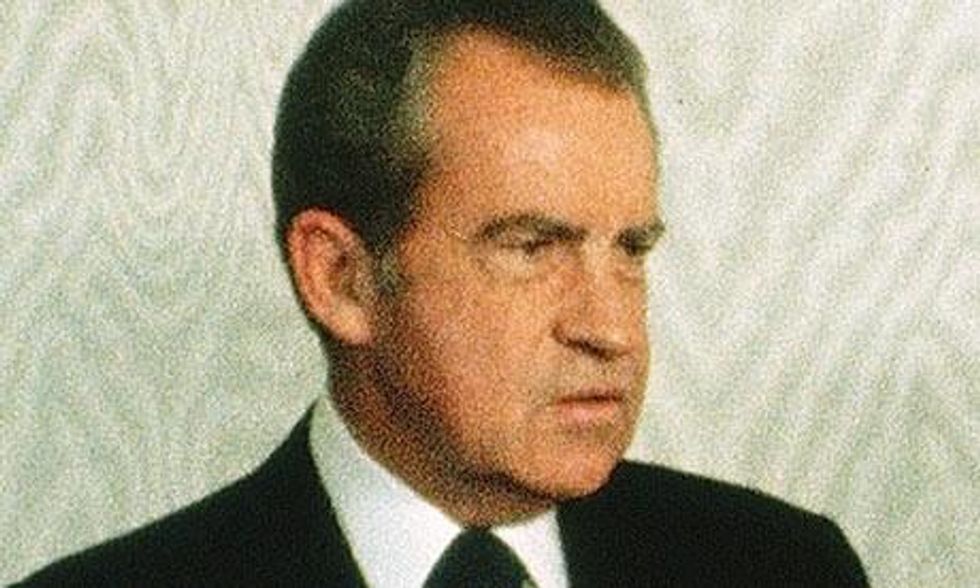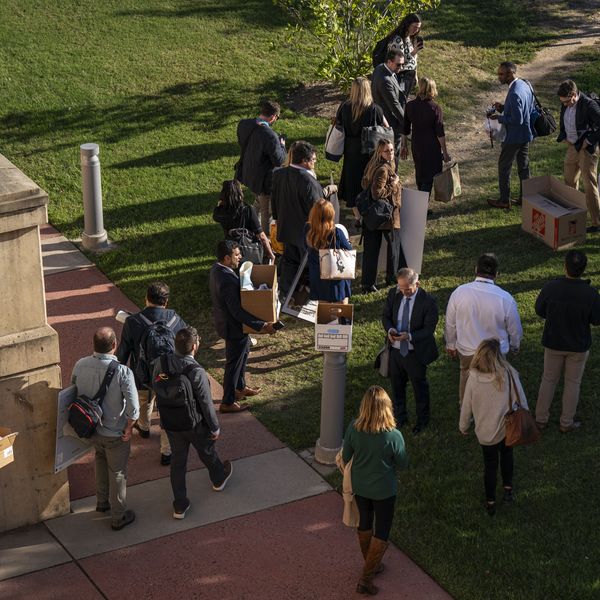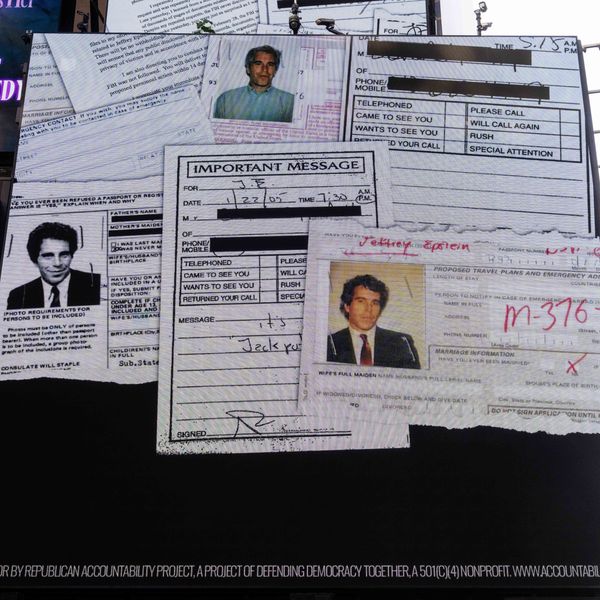'Worse Than Nixon': Pentagon Papers Lawyer on Obama, Secrecy and Press Freedoms
Career First Amendment and transparency advocate James Goodale sounds the alarm about the current president
In 1971, when the New York Times decided to publish the Pentagon Papers leaked to it by Daniel Ellsberg, it knew it was triggering a major fight with the secrecy-obsessed Nixon administration. As expected, the Nixon administration sued the NYT in an attempt to ban it from publishing the documents, but the US Supreme Court, in a landmark decision for press freedom, ruled the prior restraint unconstitutional. The paper's general counsel at the time, James Goodale, said that he counseled the paper to publish despite "the more likely scenario that everyone feared was the fact that they could have gone to jail," and he subsequently became an outspoken defender of press freedoms. He now has a new book entitled "Fighting for the Press" in which he argues, as the Columbia Journalism Review puts it, that "Obama is worse for press freedom than former President Richard Nixon was."

CJR has an amazing interview with Goodale, some relevant excerpts from which relate to many topics written about here:
Let's talk about some of the challenges to press freedom now.
The biggest challenge to the press today is the threatened prosecution of WikiLeaks, and it's absolutely frightening. . . ."The one case that is troublesome and is still out there as we speak is the case of James Risen, who was a journalist who was leaked national security information in respect to the warrantless wiretapping program, which was disclosed by The New York Times.
"He's won his case, but most people are going to be surprised if he can win it on appeal. It's been sitting on appeal for a year. Now what's going to happen -- if the shoe drops and we're back to Judy Miller, it means Risen goes to jail. And if in fact it doesn't turn out that way and it turns out well, we'll have the question of whether the government will go to the Supreme Court and we will always have the question whether it will turn out well for the next Risen. And who's behind this one? Obama."
Could you talk a bit about President Obama's approach to classified information and press freedom?
Antediluvian, conservative, backwards. Worse than Nixon. He thinks that anyone who leaks is a spy! I mean, it's cuckoo."
Could you compare what we see in the Pentagon Papers and what we see in WikiLeaks?
Well, I think it's very much the same thing. We have a leak of classified information. And by the way -- you've got to remember [Bradley] Manning's the leaker. Everyone says Assange is a leaker. He's not a leaker. He's the person who gets the information.
"So why we're so concerned about the prosecution of Assange is what he did is the same as what the Times did in the Pentagon Papers, and indeed what they did with WikiLeaks. The Times published on its website the very same material WikiLeaks published on its website. So if you go after the WikiLeaks criminally, you go after the Times. That's the criminalization of the whole process."
So you think that if John McCain or Mitt Romney were the president and doing this, there would be a different response?
We'd be screaming and yelling and the journalists would be going crazy. And that doesn't speak well of journalists."
Read the entire excellent interview here. This is from somebody who has worked on press freedom and excessive government secrecy for his entire career, including during the Bush years when he told PBS: "I think that Bush is as anti-press as the Nixon administration [was]". But citing Obama's unprecedented war on whistleblowers, targeting of core journalism, and expansion of radical secrecy doctrines, he's now sounding the alarm that Obama is worse to the point where basic press freedoms and transparency are seriously threatened.
UPDATE
One of the last chapters of Goodale's book deals specifically with Obama's record on press freedom and secrecy, while the other deals with the Obama DOJ's pursuit of WikiLeaks and Manning; and in those, he writes:
"President Barack Obama has seamlessly carried forward the main ingredients of Bush's war against the press. . . . There is no easy way to explain why Obama the president is so different from Obama the candidate on national security matters. . . . Whatever the reason, Obama became a national security hawk. . . ."Obama is no better than Bush in many aspects of the war against the press--and in some respects he is worse. He has used the criminal system to plug leaks to the press in an unprecedented fashion. He has watered down a proposed federal shield law. He has asked a New York Times reporter to disclose sources. But there may be more anti-press action to come from the Obama presidency. Obama is presently pursuing Julian Assange for publishing information leaked to him by Bradley Manning. If he succeeds in this effort, he will have succeeded where Richard Nixon failed."
Goodale is particularly compelling when documenting in detail all of the positions Obama claimed to believe in on these issues while in the Senate, and the way he has systematically breached all of them. None of this is new to readers here, of course, but the fact that Goodale is making this case, and making it with such ample documentation and detail, and so unblinkingly, is significant indeed.
An Urgent Message From Our Co-Founder
Dear Common Dreams reader, The U.S. is on a fast track to authoritarianism like nothing I've ever seen. Meanwhile, corporate news outlets are utterly capitulating to Trump, twisting their coverage to avoid drawing his ire while lining up to stuff cash in his pockets. That's why I believe that Common Dreams is doing the best and most consequential reporting that we've ever done. Our small but mighty team is a progressive reporting powerhouse, covering the news every day that the corporate media never will. Our mission has always been simple: To inform. To inspire. And to ignite change for the common good. Now here's the key piece that I want all our readers to understand: None of this would be possible without your financial support. That's not just some fundraising cliche. It's the absolute and literal truth. We don't accept corporate advertising and never will. We don't have a paywall because we don't think people should be blocked from critical news based on their ability to pay. Everything we do is funded by the donations of readers like you. Will you donate now to help power the nonprofit, independent reporting of Common Dreams? Thank you for being a vital member of our community. Together, we can keep independent journalism alive when it’s needed most. - Craig Brown, Co-founder |
In 1971, when the New York Times decided to publish the Pentagon Papers leaked to it by Daniel Ellsberg, it knew it was triggering a major fight with the secrecy-obsessed Nixon administration. As expected, the Nixon administration sued the NYT in an attempt to ban it from publishing the documents, but the US Supreme Court, in a landmark decision for press freedom, ruled the prior restraint unconstitutional. The paper's general counsel at the time, James Goodale, said that he counseled the paper to publish despite "the more likely scenario that everyone feared was the fact that they could have gone to jail," and he subsequently became an outspoken defender of press freedoms. He now has a new book entitled "Fighting for the Press" in which he argues, as the Columbia Journalism Review puts it, that "Obama is worse for press freedom than former President Richard Nixon was."

CJR has an amazing interview with Goodale, some relevant excerpts from which relate to many topics written about here:
Let's talk about some of the challenges to press freedom now.
The biggest challenge to the press today is the threatened prosecution of WikiLeaks, and it's absolutely frightening. . . ."The one case that is troublesome and is still out there as we speak is the case of James Risen, who was a journalist who was leaked national security information in respect to the warrantless wiretapping program, which was disclosed by The New York Times.
"He's won his case, but most people are going to be surprised if he can win it on appeal. It's been sitting on appeal for a year. Now what's going to happen -- if the shoe drops and we're back to Judy Miller, it means Risen goes to jail. And if in fact it doesn't turn out that way and it turns out well, we'll have the question of whether the government will go to the Supreme Court and we will always have the question whether it will turn out well for the next Risen. And who's behind this one? Obama."
Could you talk a bit about President Obama's approach to classified information and press freedom?
Antediluvian, conservative, backwards. Worse than Nixon. He thinks that anyone who leaks is a spy! I mean, it's cuckoo."
Could you compare what we see in the Pentagon Papers and what we see in WikiLeaks?
Well, I think it's very much the same thing. We have a leak of classified information. And by the way -- you've got to remember [Bradley] Manning's the leaker. Everyone says Assange is a leaker. He's not a leaker. He's the person who gets the information.
"So why we're so concerned about the prosecution of Assange is what he did is the same as what the Times did in the Pentagon Papers, and indeed what they did with WikiLeaks. The Times published on its website the very same material WikiLeaks published on its website. So if you go after the WikiLeaks criminally, you go after the Times. That's the criminalization of the whole process."
So you think that if John McCain or Mitt Romney were the president and doing this, there would be a different response?
We'd be screaming and yelling and the journalists would be going crazy. And that doesn't speak well of journalists."
Read the entire excellent interview here. This is from somebody who has worked on press freedom and excessive government secrecy for his entire career, including during the Bush years when he told PBS: "I think that Bush is as anti-press as the Nixon administration [was]". But citing Obama's unprecedented war on whistleblowers, targeting of core journalism, and expansion of radical secrecy doctrines, he's now sounding the alarm that Obama is worse to the point where basic press freedoms and transparency are seriously threatened.
UPDATE
One of the last chapters of Goodale's book deals specifically with Obama's record on press freedom and secrecy, while the other deals with the Obama DOJ's pursuit of WikiLeaks and Manning; and in those, he writes:
"President Barack Obama has seamlessly carried forward the main ingredients of Bush's war against the press. . . . There is no easy way to explain why Obama the president is so different from Obama the candidate on national security matters. . . . Whatever the reason, Obama became a national security hawk. . . ."Obama is no better than Bush in many aspects of the war against the press--and in some respects he is worse. He has used the criminal system to plug leaks to the press in an unprecedented fashion. He has watered down a proposed federal shield law. He has asked a New York Times reporter to disclose sources. But there may be more anti-press action to come from the Obama presidency. Obama is presently pursuing Julian Assange for publishing information leaked to him by Bradley Manning. If he succeeds in this effort, he will have succeeded where Richard Nixon failed."
Goodale is particularly compelling when documenting in detail all of the positions Obama claimed to believe in on these issues while in the Senate, and the way he has systematically breached all of them. None of this is new to readers here, of course, but the fact that Goodale is making this case, and making it with such ample documentation and detail, and so unblinkingly, is significant indeed.
In 1971, when the New York Times decided to publish the Pentagon Papers leaked to it by Daniel Ellsberg, it knew it was triggering a major fight with the secrecy-obsessed Nixon administration. As expected, the Nixon administration sued the NYT in an attempt to ban it from publishing the documents, but the US Supreme Court, in a landmark decision for press freedom, ruled the prior restraint unconstitutional. The paper's general counsel at the time, James Goodale, said that he counseled the paper to publish despite "the more likely scenario that everyone feared was the fact that they could have gone to jail," and he subsequently became an outspoken defender of press freedoms. He now has a new book entitled "Fighting for the Press" in which he argues, as the Columbia Journalism Review puts it, that "Obama is worse for press freedom than former President Richard Nixon was."

CJR has an amazing interview with Goodale, some relevant excerpts from which relate to many topics written about here:
Let's talk about some of the challenges to press freedom now.
The biggest challenge to the press today is the threatened prosecution of WikiLeaks, and it's absolutely frightening. . . ."The one case that is troublesome and is still out there as we speak is the case of James Risen, who was a journalist who was leaked national security information in respect to the warrantless wiretapping program, which was disclosed by The New York Times.
"He's won his case, but most people are going to be surprised if he can win it on appeal. It's been sitting on appeal for a year. Now what's going to happen -- if the shoe drops and we're back to Judy Miller, it means Risen goes to jail. And if in fact it doesn't turn out that way and it turns out well, we'll have the question of whether the government will go to the Supreme Court and we will always have the question whether it will turn out well for the next Risen. And who's behind this one? Obama."
Could you talk a bit about President Obama's approach to classified information and press freedom?
Antediluvian, conservative, backwards. Worse than Nixon. He thinks that anyone who leaks is a spy! I mean, it's cuckoo."
Could you compare what we see in the Pentagon Papers and what we see in WikiLeaks?
Well, I think it's very much the same thing. We have a leak of classified information. And by the way -- you've got to remember [Bradley] Manning's the leaker. Everyone says Assange is a leaker. He's not a leaker. He's the person who gets the information.
"So why we're so concerned about the prosecution of Assange is what he did is the same as what the Times did in the Pentagon Papers, and indeed what they did with WikiLeaks. The Times published on its website the very same material WikiLeaks published on its website. So if you go after the WikiLeaks criminally, you go after the Times. That's the criminalization of the whole process."
So you think that if John McCain or Mitt Romney were the president and doing this, there would be a different response?
We'd be screaming and yelling and the journalists would be going crazy. And that doesn't speak well of journalists."
Read the entire excellent interview here. This is from somebody who has worked on press freedom and excessive government secrecy for his entire career, including during the Bush years when he told PBS: "I think that Bush is as anti-press as the Nixon administration [was]". But citing Obama's unprecedented war on whistleblowers, targeting of core journalism, and expansion of radical secrecy doctrines, he's now sounding the alarm that Obama is worse to the point where basic press freedoms and transparency are seriously threatened.
UPDATE
One of the last chapters of Goodale's book deals specifically with Obama's record on press freedom and secrecy, while the other deals with the Obama DOJ's pursuit of WikiLeaks and Manning; and in those, he writes:
"President Barack Obama has seamlessly carried forward the main ingredients of Bush's war against the press. . . . There is no easy way to explain why Obama the president is so different from Obama the candidate on national security matters. . . . Whatever the reason, Obama became a national security hawk. . . ."Obama is no better than Bush in many aspects of the war against the press--and in some respects he is worse. He has used the criminal system to plug leaks to the press in an unprecedented fashion. He has watered down a proposed federal shield law. He has asked a New York Times reporter to disclose sources. But there may be more anti-press action to come from the Obama presidency. Obama is presently pursuing Julian Assange for publishing information leaked to him by Bradley Manning. If he succeeds in this effort, he will have succeeded where Richard Nixon failed."
Goodale is particularly compelling when documenting in detail all of the positions Obama claimed to believe in on these issues while in the Senate, and the way he has systematically breached all of them. None of this is new to readers here, of course, but the fact that Goodale is making this case, and making it with such ample documentation and detail, and so unblinkingly, is significant indeed.

